05/19/21
K-State Current - May 19, 2021
K-State Current is a weekly news update for the Kansas Board of Regents to apprise the Regents on a few of the many successes and achievements made by K-State faculty, staff and students.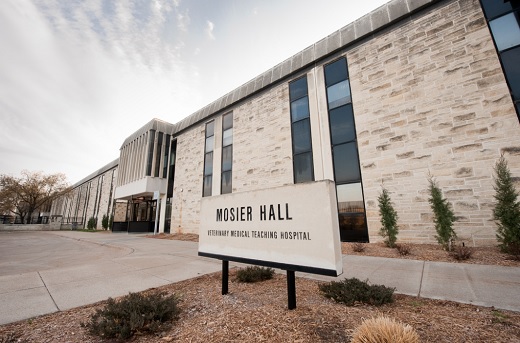
K-State News
University-developed US animal disease ID system receives Tyson support
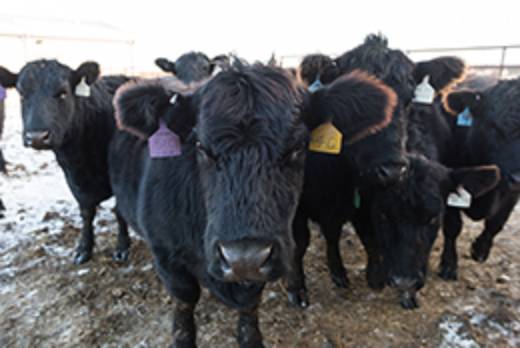 CattleTrace ear tags include ultrahigh frequency chips to track movements of a given group of cattle. The national cattle identification system was first developed at Kansas State University.
CattleTrace ear tags include ultrahigh frequency chips to track movements of a given group of cattle. The national cattle identification system was first developed at Kansas State University.
A national cattle identification system that was first developed at Kansas State University has received a big boost of support from one of the country ' s largest food companies.
Tyson Fresh M eats , a subsidiary of Tyson Foods Inc. , is backing U.S. Cat t leTrace , a system that uses ear tags with ultrahigh frequency technologies to establish a national animal disease traceability system.
The system was first tested in 201 8 as a pilot project led by K-State, the Kansas Livestock Association, the Kansas Department of Agriculture, the U.S. Department of Agriculture and individual producers.
At the time, university researchers were interested in developing a system to help safeguard Kansas ' $17 billion cattle industry. The idea was to garner support among producers, who would attach ear tags with ultrahigh frequency chips. As cattle moved through the production system, researchers could collect data on their location s and movements on computers located centrally in Manhattan.
In the case of disease outbreak, knowing the movements of a given group of cattle — and w hat herds they may have interacted with — i s a big advantage to keeping the entire industry from facing a shutdown. Having information on the movement of cattle herds would mean that only a small segment of animals would need to be isolated.
Tyson ' s support is a key indicator that the system is gaining momentum nationally. Located in Springdale, Arkansas, Tyson Foods Inc. is the world ' s second-largest processor and marketer of chicken, beef and pork. Its fresh meats division operates six beef plants across the United States.
" Attracting investments from outside Manhattan represents one way K-State is working to build economic prosperity in the community, region and state, " said Beth Montelone, K-State interim vice president for research. " Tyson ' s support of this successful system that was developed at K-State demonstrates the university ' s commitment to fulfilling our land-grant mission to improve quality of life for all through education, research and outreach. "
CattleTrace directly supports the beef cattle ranching and farming sector, which is the top employer in Kansas with the highest financial output .
" K-State ' s partnership in increasing economic development in the greater Manhattan region is a tremendous asset, " said Jason Smith, president and CEO of the Manhattan Area Chamber of Commerce. " This new support for the beef industry in Kansas and potential for future industry attraction in this sector are excellent indicators for job growth in the region. "
" Animal health and disease traceability are critical issues for the meat industry and we ' re hopeful our involvement will help advance industry efforts to implement this program across the country , " said Shane Miller, group president of Tyson Fresh Meats, in a news release from Tyson . " We believe CattleTrace can help to reduce the risk that animal disease poses to the U.S. cattle supply, while also protecting our industry ' s access to important export markets, which can quickly be compromised in the event of an animal health issue. "
Brandon Depenbusch, the vice president of cattle operations at Innovative Livestock Services Inc. near Great Bend, was closely involved in the 2018 pilot project to test an animal disease identification system in Kansas.
" As leaders in the cattle industry, we are excited to see Tyson Fresh Meats ' commitment to animal health and disease traceability in the United States, " said Depenbusch, who now is chair of the U.S. CattleTrace board of directors. " We ' ve heard from stakeholders across the country that in order for a producer-led system to succeed, buy-in amongst all sectors is needed. This commitment from a leader in beef processing shows that no matter where we come from in the cattle industry, we are all working toward s a common goal of protecting our nation ' s herd and the highest quality, most sustainable beef product in the world. "
More information about U.S. CattleTrace is available onl i ne and in the spring 2019 issue of Seek ma g azine .
University selects David V. Rosowsky as vice president for research
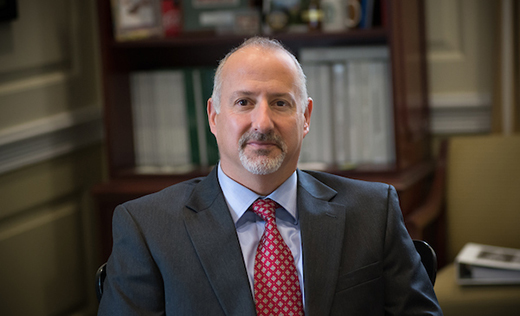 An expert in structural engineering, natural hazards and risk analysis and a national voice on the future of land-grant universities will serve as Kansas State University's next vice president for research. David V. Rosowsky, professor of civil engineering at the University of Vermont, has been appointed to lead all aspects of K-State's research enterprise by President Richard Myers.
An expert in structural engineering, natural hazards and risk analysis and a national voice on the future of land-grant universities will serve as Kansas State University's next vice president for research. David V. Rosowsky, professor of civil engineering at the University of Vermont, has been appointed to lead all aspects of K-State's research enterprise by President Richard Myers.
"We are pleased to welcome David Rosowsky to K-State with his proven track record and his passion for the land-grant mission," said Richard Myers, university president. "His background in higher education aligns well with our strategic direction as we continue to raise our national and international profile as a major research institution. He is an innovator and accomplished communicator who can help drive focus and visibility for our research and economic development efforts."
Rosowsky, who will begin his new duties in July, will report to Myers and be a member of the president's cabinet. He will be responsible for encouraging and facilitating the integration and enhancement of research, scholarly and creative activities across the university's colleges and multiple research centers, and will lead universitywide strategic research growth activities. He will provide leadership for the acquisition of research funding, the planning and development of academic research space, patenting and commercialization efforts, the incubation of new companies and recruitment of corporate research partners, and guiding public outreach.
As vice president for research, Rosowsky will have administrative responsibility for units that support the university's research infrastructure, including the Office of Research Development, Pre-Award Services, the University Research Compliance Office and more. Several of the university's independent, interdisciplinary research facilities and research support facilities, including the Biosecurity Research Institute, the National Agricultural Biosecurity Center, K-State Innovation Partners, the Biotechnology Core Facility and the Electronics Design Laboratory, also will report to Rosowsky.
"Kansas State University is one of the nation's top land-grant universities," Rosowsky said, "with exceptional faculty, facilities, and both demonstrated and reaffirmed commitments to discovery and impact in service to the people and communities of the state of Kansas, the nation and the world. The three-part focus of this role on research, innovation and economic development is extremely exciting to me, as are the commitments to growth, new partnerships, engagement and impact. I am honored to be joining K-State at this exciting time."
Rosowsky served as provost and senior vice president at the University of Vermont from 2013-2019, where he drove significant growth in the research enterprise, the launch of several new transdisciplinary centers and institutes, and the creation of a universitywide innovation and entrepreneurship ecosystem.
Since 2019, he has been a faculty member in the civil and environmental engineering department where he has been engaged in teaching both undergraduate and graduate classes and research in earthquake engineering and post-disaster assessment. He also writes about the pandemic's impact on public universities and the opportunities for institutions to emerge from the pandemic stronger, more resilient, more accessible and more sustainable. His writing has appeared in Forbes, The Chronicle for Higher Education, Inside Higher Ed, University Business, Trusteeship Magazine and several other major publications. As a recognized higher education thought-leader, Rosowsky also has been invited to speak with university leadership teams, boards and foundations on higher education leadership, finances, governance, partnerships, innovation and entrepreneurship, particularly in the context of preparing for the post-pandemic era in higher education.
Before joining Vermont, Rosowsky was dean of engineering at Rensselaer Polytechnic Institute from 2009-2013, head of the Zachry Department of Civil Engineering Department and A.P. and Florence Wiley chair in civil engineering at Texas A&M University from 2004-2009 and was the Richardson chair in wood engineering and mechanics at Oregon State University from 2000-2004. His early faculty career was spent as a civil engineering faculty member at Clemson University.
As a researcher, Rosowsky has supervised more than 50 graduate students and postdocs and has authored or co-authored more than 160 papers in peer-reviewed journals and more than 140 papers as part of conference proceedings. He is a recognized expert in the field of structural reliability and has been invited to share his work around the world, including in France, Italy, Switzerland, Canada, Japan, Australia and New Zealand. His work has received many honors, including the American Society of Civil Engineers' Walter L. Huber Research Prize and Norman Medal and the T.K. Hseih Award from the Institute of Civil Engineers in the United Kingdom. He also is fellow of the American Society of Civil Engineers and the Structural Engineering Institute.
Rosowsky earned bachelor's and master's degrees in civil engineering from Tufts University and a doctorate in civil engineering from Johns Hopkins University.
Joe Mocnik named new dean of K-State Libraries
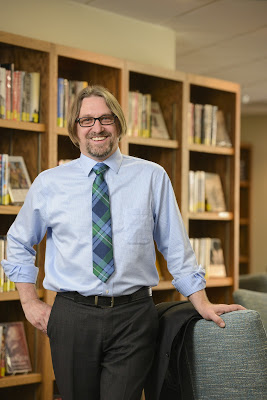 Joe Mocnik, an experienced university librarian and administrator, has been named the new dean of K-State Libraries at Kansas State University. Mocnik's appointment, which begins July 25, was made by K-State Provost and Executive Vice President Charles Taber following a national search.
Joe Mocnik, an experienced university librarian and administrator, has been named the new dean of K-State Libraries at Kansas State University. Mocnik's appointment, which begins July 25, was made by K-State Provost and Executive Vice President Charles Taber following a national search.
"We welcome Dr. Mocnik to Kansas State University and will rely on his expertise, leadership and strategic vision to ensure that the K-State library system is always ready to meet the ever-evolving needs of our public research university," Taber said. "Student learning and success will be at the forefront of Dr. Mocnik's priorities, as well as promoting and supporting increased research and scholarship across the university in support of K-State's goal to become a Top 50 public research university."
As dean of K-State Libraries, Mocnik, who currently serves as dean of libraries at North Dakota State University, will oversee a research library system with a total budget of $13.5 million and a collection of 3.6 million titles. He will work collaboratively with partners across the four K-State campuses and in its nine colleges to develop a broad and synergistic alignment of library services supporting the continuing transformation of K-State Libraries as a center encouraging student research, academic excellence and collaboration in a technologically rich environment.
Mocnik, who will report to Taber and serve on the Council of Deans, will be responsible for the administration, coordination and oversight of all activities related to strategic planning; assessment; policy development; library, archives, and records management services and programs; physical space; collections development and preservation; budget planning and fiscal stewardship; staffing; fundraising; and technology adoption.
"I am truly honored by the appointment and excited about joining the talented team of faculty and staff at K-State Libraries to further the mission of the nation's first operational land-grant university. My desire is to ensure that the Libraries serve as a catalyst for student success, research and discovery for all, including K-State Research and Extension. By enhancing innovation, accelerating systemic change toward justice and equity, and harnessing the creative energy of the local and regional community, my desire is to foster a culture of excellence that generates widely recognized interdisciplinary research and scholarly and creative activities in a variety of disciplines and that benefits society as a whole."
Appointed dean of libraries at North Dakota State in 2017, Mocnik is responsible for all university library services and resources. As dean, Mocnik has developed a comprehensive strategic plan with an equity, diversity and inclusion emphasis, and refocused its mission, vision and values statement. He established a digital scholarship advisory board to provide the framework for implementing efficient digital practices for all data assets; rebranded 3D printing into a digital fabrication lab to better serve students; and developed innovative outreach efforts and helped with fundraising and increasing donors.
Before joining North Dakota State, Mocnik was director of the university library and professor at Georgia College & State University from 2012-2017; director of libraries and professor at Southern Adventist University from 2008-2012; and director of library services and associate professor at Mount Aloysius College from 2004-2008. He served as a doctoral fellow at Bowling Green State University from 2001-2004 and was director of the multimedia center and bibliography services librarian at Andrews University from 1999-2001.
Mocnik has been an invited speaker nationally and internationally. He is regularly serving for various accreditation organizations such as the Higher Learning Commission and the American Library Association. He has been published in several journals and contributed several chapters to books on the Cold War, particularly related to Yugoslavia, as well as U.S. history and politics. He is an active member of the American Library Association, the Association of College and Research Libraries, CORE and other professional organizations.
A Fulbright scholar in Croatia, Mocnik was awarded a Distinguished Dissertation Award. He earned his bachelor's degree in humanities from Newbold College, master's degree in library science from University College London, and doctoral degree in history at Bowling Green State University.
Both Mocnik and his wife, Mirta, are from Croatia. They have two sons, Noel, a member of the Air National Guard who is studying cybersecurity, and Ben, a landscape architecture student. In his free time, Mocnik likes to travel, learn languages, and enjoys long walks with the couple's Newfoundland mix, Snowball.
K-State Faculty Highlights
Presidential Award winners recognized for teaching, leadership
Excellence in leadership and teaching is earning three individuals Kansas State University's 2021 Presidential awards.
Scott DeLoach, professor and head of the computer science department, is the recipient of the Presidential Award for Outstanding Department Head. Mary Kay Siefers, teaching professor in the Staley School of Leadership Studies, is receiving the Presidential Award for Excellence in Undergraduate Teaching. Joshua Drouin, graduate teaching assistant and doctoral student in mathematics, has been selected for the Presidential Award for Excellence in Undergraduate Teaching by a Graduate Teaching Assistant.
Each award includes a $5,000 honorarium sponsored by the university president's office and Curtin Property Company, a real estate development firm with offices in Manhattan and Kansas City.
"The Curtin Property Company is proud to have founded this unique partnership with Kansas State University more than 25 years ago to honor excellence among K-State's outstanding faculty and leaders," said Chris Curtin, company president. "The Curtin Property Company, its numerous K-State graduates and its Manhattan associates at Georgetown Apartment Homes and Westchester Park Apartments congratulate the 2021 Presidential Awards of Excellence winners."
Since becoming interim department head in 2014 and his appointment as permanent head in 2016, DeLoach has worked to boost his department's enrollment, expand its undergraduate and graduate academic programs, increase scholarship funding, strengthen diversity and inclusion efforts and improve facilities and infrastructure.
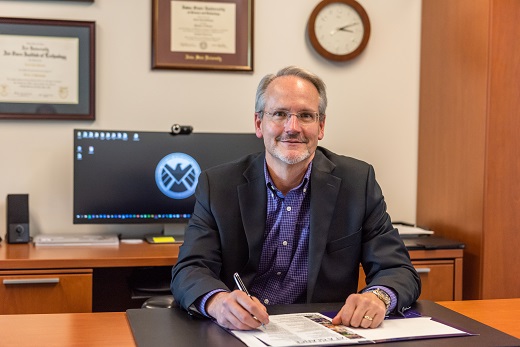 Under DeLoach's tenure, the department's enrollment has increased around 30%, which includes a nearly 6% increase in multicultural student enrollment. The department's doctoral graduates have increased more than 50% in the last five years and the department has created a scholars program that has provided more than $100,000 in scholarships. New academic programs include a program to earn both a bachelor's degree in computer science and a Master of Business Administration in five years; adding cybersecurity and entrepreneurship program options for students; launching a certificate in computer science; and creating an online master's degree program in computer science. The department also launched the Computational Core Initiative, an online program to teach non-computer science majors programming skills. This program is being expanded to high schools and small colleges and community colleges.
Under DeLoach's tenure, the department's enrollment has increased around 30%, which includes a nearly 6% increase in multicultural student enrollment. The department's doctoral graduates have increased more than 50% in the last five years and the department has created a scholars program that has provided more than $100,000 in scholarships. New academic programs include a program to earn both a bachelor's degree in computer science and a Master of Business Administration in five years; adding cybersecurity and entrepreneurship program options for students; launching a certificate in computer science; and creating an online master's degree program in computer science. The department also launched the Computational Core Initiative, an online program to teach non-computer science majors programming skills. This program is being expanded to high schools and small colleges and community colleges.
Faculty in the department are thriving under DeLoach, who has hired 10 new faculty members, converted three instructors into teaching assistant professors, created professional advisor positions and increased the budget for staff development. Refereed publications by department faculty and graduate students have increased 100% in the last five years, while research expenditures are up by approximately 20%. DeLoach also has worked to make physical improvements to several of the department's laboratories and install the latest in instructional hardware and software.
"Being the department head of computer science has been the absolute best professional experience of my life," DeLoach said. "I work with great faculty and staff who have great passion for our students, both in the classroom and in research. My goal is to support them as much as possible and stay out of their way so they can be free to be themselves and do great things."
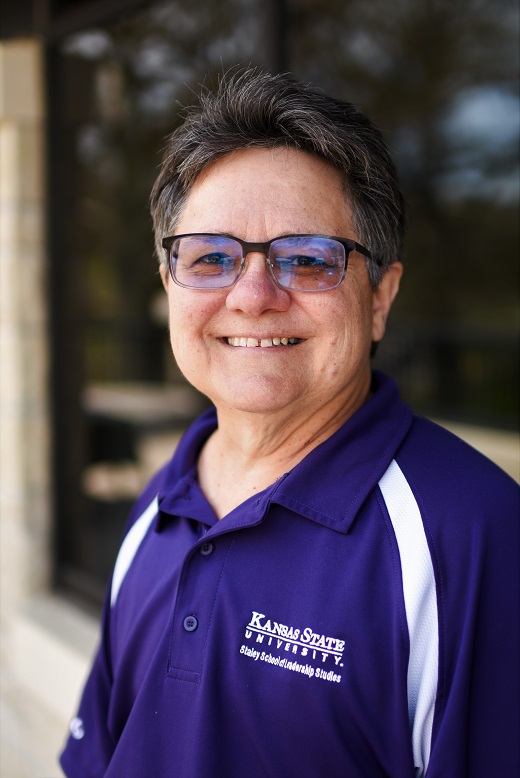 Since joining the Staley School of Leadership Studies 21 years ago, Siefers has taught every core leadership course offered by the school, reaching thousands of undergraduates. Siefers uses the power of engagement to teach students, especially first-year students in large lecture courses. Early in her tenure with the Staley School, she initiated the use of peer leaders — juniors and seniors — to facilitate small group discussion in one of the program's largest lecture classes, LEAD 212: Introduction to Leadership Studies, which serves 800-plus first-semester students in the leadership studies minor. This practice is still in use today.
Since joining the Staley School of Leadership Studies 21 years ago, Siefers has taught every core leadership course offered by the school, reaching thousands of undergraduates. Siefers uses the power of engagement to teach students, especially first-year students in large lecture courses. Early in her tenure with the Staley School, she initiated the use of peer leaders — juniors and seniors — to facilitate small group discussion in one of the program's largest lecture classes, LEAD 212: Introduction to Leadership Studies, which serves 800-plus first-semester students in the leadership studies minor. This practice is still in use today.
In 2018, Siefers collaborated with the College of Agriculture to develop the interdisciplinary secondary major in global food systems leadership, which is offered by the School of Leadership Studies and challenges undergraduates to make positive change on global problems facing food and agriculture. As director of the program, Siefers is actively involved in student recruitment, creating program curriculum and teaching courses. She also serves as faculty advisor and co-creator of the Food Security Scholars program.
Siefers is also known for her mentorship of students and faculty members. During the pandemic, she has helped Staley School faculty find creative ways and learn about the latest technological tools to stay connected with students, whether teaching in person or online.
"I am honored and humbled to receive this recognition for my teaching efforts considering all the outstanding instructors at K-State," Siefers said. "I want to thank my colleagues at the Staley School of Leadership Studies who provide their unwavering support and encouragement as we create transformational learning experiences for our students. Finally, I want to thank all the students who have given so much of themselves for the sake of their own learning and that of their classmates. I was born to teach and I am in the perfect place and with the best students to engage in the learning process."
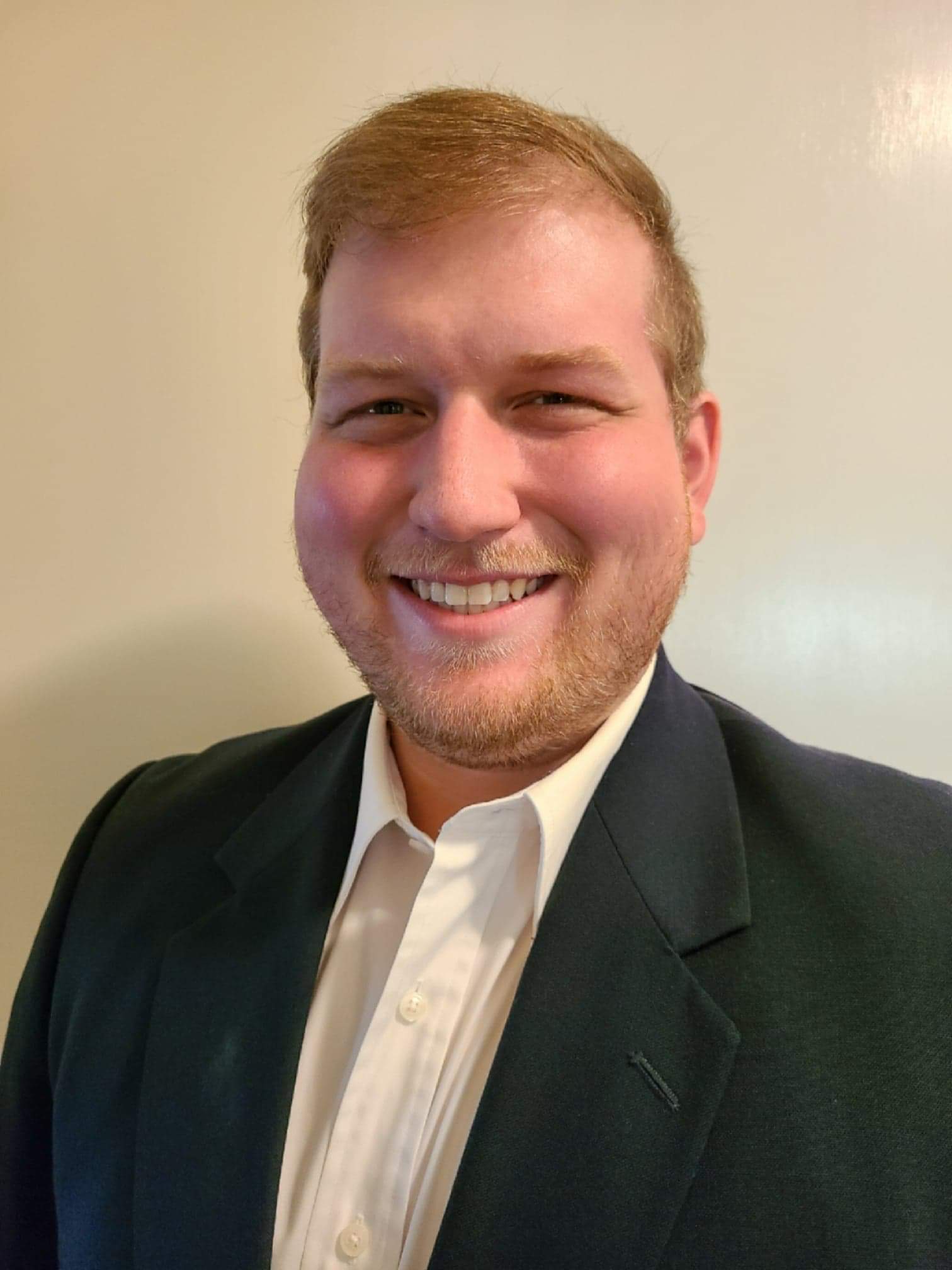 Student success is a priority with Drouin, who has had a special focus on teaching students who can benefit from extra academic support. Courses Drouin has taught include First Year Seminar in College Algebra and First Year Seminar in Intermediate Algebra — the first mathematics GTA to be assigned the course.
Student success is a priority with Drouin, who has had a special focus on teaching students who can benefit from extra academic support. Courses Drouin has taught include First Year Seminar in College Algebra and First Year Seminar in Intermediate Algebra — the first mathematics GTA to be assigned the course.
He also works with K-State's Multicultural Academic Program Success, or MAPS, program, which helps underserved students get a head start on college the summer before their freshman year. For MAPS, Drouin taught a special section of College Algebra, condensing 16 weeks of material into six weeks of instruction and ensuring students understood the material and kept up with the pace of the course. Drouin is known for adapting his teaching to fit the specific needs of his students so they can succeed.
"I not only want students to have confidence in the material, but also in their ability to learn and seek help if needed," Drouin said. "I'm not just preparing students to pass a class; I'm also preparing them to have confidence in innumerable future endeavors."
Drouin earned bachelor's degrees in mathematics and economics from Murray State University in 2017, graduating summa cum laude. At K-State, he earned his master's degree in mathematics in 2019 and expects to complete his doctorate in May 2023. He is the son of David Drouin, Murray, Kentucky, and Norma Pruitt, Mayfield, Kentucky.
K-State Student News
K-State Crops Team Completes Successful Spring Season
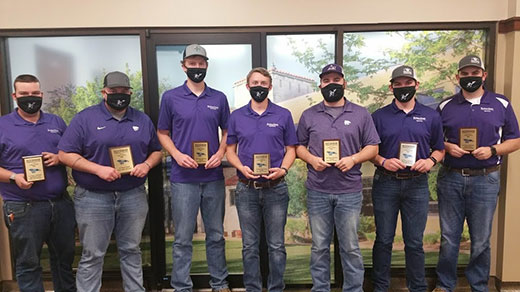 Members of the 2021 K-State crops judging team include (l to r) Alex Kaufmann, Jaden Strohl, Blake Kirchhoff, Luke Ryan, Evan Bott, Austin Hobbs, Trevor Mullen.
Members of the 2021 K-State crops judging team include (l to r) Alex Kaufmann, Jaden Strohl, Blake Kirchhoff, Luke Ryan, Evan Bott, Austin Hobbs, Trevor Mullen.
Seniors Luke Ryan and Blake Kirchhoff posted a 1-2 finish to lead the Kansas State University crops team to a first place finish at the national invitational crops contest recently.
The squad jumped back into in-person competition this spring after a pause caused by the COVID-19 pandemic in 2020.
Ryan, who is from Solomon, Kansas, and Kirchhoff, from Hardy, Nebraska, grabbed the top two individual spots, but were followed closely by teammates Evan Bott (junior from Palmer, Kansas) in fourth and Trevor Mullen (junior from Salina, Kansas) in twelfth.
The alternate team members included Alex Kaufmann (junior from Concordia, Kansas, who placed eighth overall) Jayden Strohl (junior from Cunningham, Kansas) and Austin Hobbs (junior from Buffalo, Kansas). All are agronomy majors at K-State.
The national invitational was hosted by Hutchinson Community College. K-State beat Iowa State (second) and the University of Nebraska (third). Nine four-year schools, four two-year schools, and four high school teams also competed.
Crops teams compete in four categories, including laboratory practical, agronomic exam, math practical and plant and seed identification. As a team, K-State placed first in lab and exam and second in math and identification. Individually, Ryan was first in all four components, while Kirchhoff tied for first in math and was second in lab and identification. Bott was third in laboratory practical.
This was the second spring competition for K-State’s team. At the regional contest in March, K-State placed second to Iowa State. Ryan and Kirchhoff also swept the top two individual spots at regionals.
Last fall, K-State’s crops team won a virtual crops contest held online during the national meeting of the Students of Agronomy Soils and Environmental Sciences. Ryan and Kirchoff swept the top two spots and Madison Tunnell (senior from Overland Park, Kansas) placed fifth. Tunnell graduated in December and did not compete with the team this spring.
The team is coached by K-State professor of agronomy Kevin Donnelly and graduate student Sarah Zerger.
K-State Polytechnic student helps Ashby House land grant
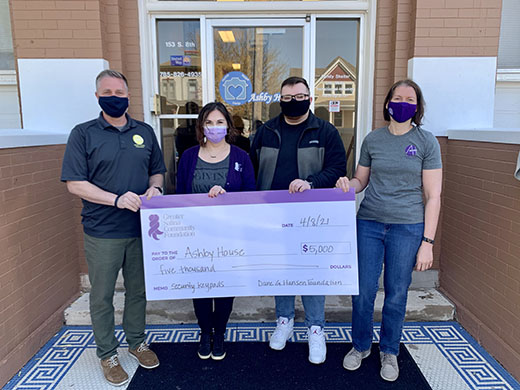 Dalton Ramsey, senior in social work, third from left, helped Ashby House in Salina land a $5,000 grant for its drug and alcohol treatment transitional housing program.
Dalton Ramsey, senior in social work, third from left, helped Ashby House in Salina land a $5,000 grant for its drug and alcohol treatment transitional housing program.
Dalton Ramsey, a senior in social work, Salina, at Kansas State Polytechnic Campus, picked his major because he wants to help others. He's putting his education into action by helping the community service organization where he served as a student intern with a specific need.
Ramsey successfully wrote a $5,000 grant proposal for Ashby House in Salina. The grant will be used to install a keycard-entry security door for residents with the Ashby House Sober Living program, which provides a safe and structured living environment for women who are in drug and alcohol treatment and offers family apartments for its women residents with children.
"The new security door will make it harder for unwanted persons or unwanted substances to enter the transitional housing program," said Andy Houltberg, Ashby House executive director.
K-State social work students have participated in practicums at Ashby House since its beginning, Houltberg said. Ramsey is the first K-State Polytechnic student to be involved with the new program.
"Dalton was eager to pitch in and learn new things," Houltberg said.
After expressing an interest in grant writing, Ramsey was tasked with completing the grant request from Ashby House to the Greater Salina Community Foundation and Dane G. Hansen Foundation for the funding.
"I had to completely reteach myself how to write," Ramsey said. "Technical writing takes a compelling narrative backed up by great sources."
Grant writing is now a skill Ramsey will add to his resume. After graduating from K-State Polytechnic in May, Ramsey plans to pursue a master’s degree in substance abuse and mental health. His interest was sparked through personal experiences with substance abuse and by the death of his favorite artist, Mac Miller, from an accidental overdose.
"I've always tended to put others above myself," Ramsey said. "Social work gives me the platform to do that on a wider scale."